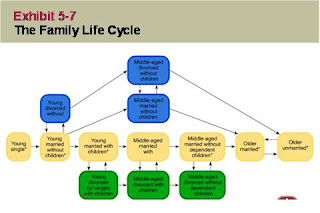I come from an unusual family. We wouldn’t be able to sleep at night if we had a penny extra change. I don’t know if you remember the Simpsons episode where Marge samples a grape and Lisa makes her pay for it? (It wasn’t on YouTube), but that’s like my entire family. I like to think that is normal but I don’t think it is. We all have very strong morals and the thought of stealing something, being rude or even getting drunk horrifies us.
As we have studied, many things impact personal values. Experiences in life, religion, but most importantly, our primary socialisation, our family value systems. Family is the second thing on Kotler's diagram below, under socialisation.

I am lucky enough to have been raised with a traditional nuclear 2.5 kid’s kind of family, my brother who is even more principle-driven than me! This difference between us incurs as we have led different lives. Same parents, school, house, family, extended family, but there is still a difference. This is where life experience comes in. Following is a timeline of my life:
1989 Born
1990 Mandela Freed, earliest memory, very vague.
1995 Mum loses baby.
1996 Moved to Abu Dhabi, biggest experience of childhood, moved house, school, from family, whole life changed.
1997 Diana Dies in Car Crash, distinctly remember this. Scientists clone Dollie the sheep, Never realised the massive implication this would have on the world.
2000 Georgia dies in car crash. Broke my heart. Changed me into a completely new person. Made biggest impact on me in my whole life so far.
2001 9/11, sat in my living room watching in disbelief. I reach International championships in free skating and come out with gold for my level. Charlotte hit by a car and dies the same day as the competition; she was supposed to be watching and pulled out. I never skate again.
2003 Tension in Gulf States as Iraq war begins.
2004 Tsunami.
2005 Finish GCSE’s and start 6th form. Get into finals of Dubai Pop Idol, come 8th of 3000. Get to open for Kanye West.
2007 Finish A Levels. Spend 3 months in Australia. Work 7 months in a nursery, develop a disliking for children!
2008 Car crash whilst visiting Natalie in Red Hill, Break my coccyx (bottom of my spine), spend weeks in bed. Move to England for Uni. Start University a couple of months later. Nan dies 2 weeks into term.
2009 Obama elected as US president.
So yes, some of these as the same as my brother would have experienced but in terms of my hobbies, deaths of my friends and my car crash, these are all experiences very personal to me and no-one will ever know how I truly felt, no matter how much I try to explain, and how they impacted me.
The ‘family’ as a whole is a consumer. There are communal needs, usually bought by the mother, the intuitive one who will recognise that when there is a shortage of food or toilet roll, some needs to be bought. There cannot now be a generalisation made about families. There is not necessarily one breadwinner with 4 children. There may be ten children or one child, and both parents may work, or neither. This impacts their consumer behaviour of course.
There is a family life cycle that the majority of people experience. Firstly there is the bachelor, who characteristically is young, characteristically is young, single, and not living at home. Secondly, there is the newly married, who are young with no children; and then there is the first stage of having a full nest, where the youngest child is under 6. Then there is the second stage of the full nest. This is when the youngest child is six or over. Last of the full nest is the third stage where the parents are older, married and living with dependent children. The first empty nest stage is those who are older, married, with no children living at home. The second stage is where the parents are older, married, retired with no children at home. The last 2 stages are those of the solitary survivor. The first is in labour force and the second is retired. Below is a visual explanation.

As you probably know, if your mum used fairy washing up liquid, the chances are you will. The purchase of household FMCG’s is passed through generations, i still buy the same table salt, cream crackers, cheese, butter and washing up liquid as my grandmother did. What does this mean for marketers? Well, if you manage to obtain a lifelong customer in one person, you may well end up with generations of them.

1 comment:
Excellent reflection - very thought provoking
Post a Comment